Hyundai Staria VS Renault Trafic Bus
Hyundai Staria
The Hyundai Staria stands out with its futuristic design, characterised by sleek lines and an expansive front grille that makes a bold statement on the road. Inside, it offers a spacious and versatile interior, providing a comfortable ride for both driver and passengers. This vehicle effortlessly combines practicality with a touch of luxury, appealing to families and professionals alike.
detailsRenault Trafic Bus
The Renault Trafic Bus is a versatile and spacious option for those needing to transport multiple passengers comfortably. With its modern design and practical features, it is well-suited for both business and leisure purposes. Its efficient engine and smooth handling make it a reliable choice for long journeys.
details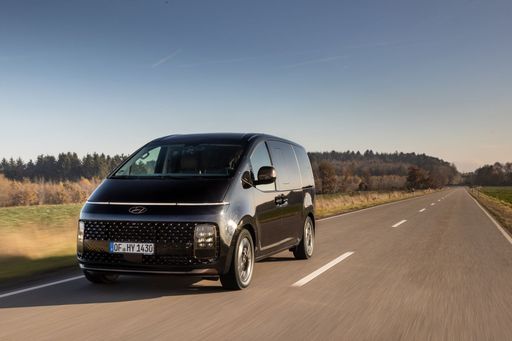 @ hyundai.news
@ hyundai.news
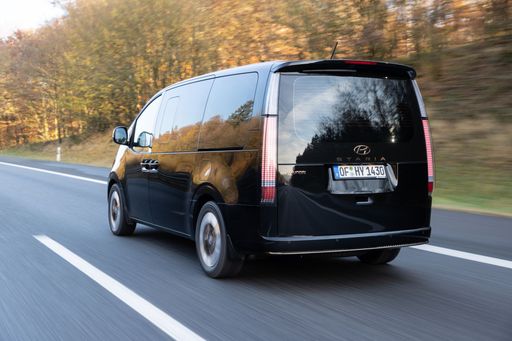 @ hyundai.news
@ hyundai.news
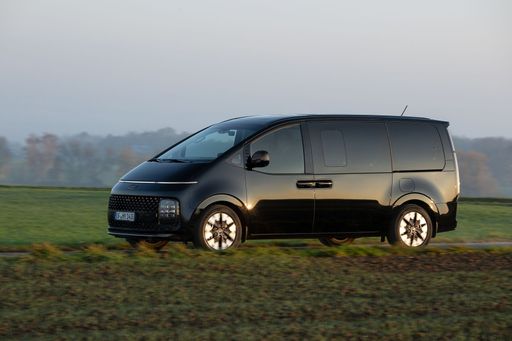 @ hyundai.news
@ hyundai.news
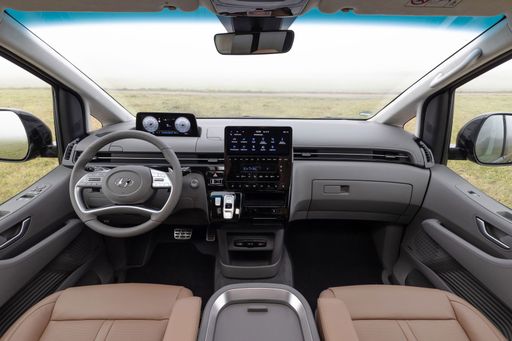 @ hyundai.news
@ hyundai.news
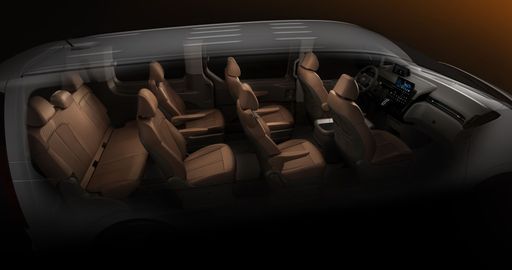 @ hyundai.news
@ hyundai.news
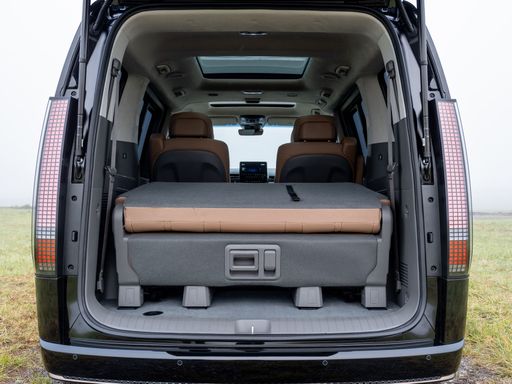 @ hyundai.news
@ hyundai.news

|
|
|
|
|
Costs and Consumption |
|
|---|---|
|
Price
about 41200 - 51100
£
|
Price
about 36000 - 51900
£
|
|
Consumption L/100km
7.6 - 8.9
L
|
Consumption L/100km
6.8 - 7.2
L
|
|
Consumption kWh/100km
-
|
Consumption kWh/100km
-
|
|
Electric Range
-
|
Electric Range
-
|
|
Battery Capacity
-
|
Battery Capacity
-
|
|
co2
172 - 232
g/km
|
co2
178 - 190
g/km
|
|
Fuel tank capacity
65 - 75
L
|
Fuel tank capacity
80
L
|
Dimensions and Body |
|
|
Body Type
Bus
|
Body Type
Bus
|
|
Seats
7 - 9
|
Seats
8
|
|
Doors
5
|
Doors
4
|
|
Curb weight
2275 - 2443
kg
|
Curb weight
2041 - 2340
kg
|
|
Trunk capacity
117 - 831
L
|
Trunk capacity
-
|
|
Length
5253
mm
|
Length
5080 - 5480
mm
|
|
Width
1997
mm
|
Width
1956
mm
|
|
Height
1990
mm
|
Height
1973 - 1974
mm
|
|
Payload
587 - 775
kg
|
Payload
730 - 1010
kg
|
Engine and Performance |
|
|
Engine Type
Diesel, Full Hybrid
|
Engine Type
Diesel
|
|
Transmission
Automatic
|
Transmission
Manuel, Automatic
|
|
Transmission Detail
Automatic Gearbox
|
Transmission Detail
Manual Gearbox, Automat. Schaltgetriebe (Doppelkupplung)
|
|
Drive Type
All-Wheel Drive, Front-Wheel Drive
|
Drive Type
Front-Wheel Drive
|
|
Power HP
177 - 225
HP
|
Power HP
110 - 170
HP
|
|
Acceleration 0-100km/h
10.2 - 13.5
s
|
Acceleration 0-100km/h
10.6 - 16.5
s
|
|
Max Speed
167 - 185
km/h
|
Max Speed
161 - 186
km/h
|
|
Torque
367 - 430
Nm
|
Torque
300 - 380
Nm
|
|
Number of Cylinders
4
|
Number of Cylinders
4
|
|
Power kW
130 - 165
kW
|
Power kW
81 - 125
kW
|
|
Engine capacity
1598 - 2199
cm3
|
Engine capacity
1997
cm3
|
|
Top speed
167 - 185
km/h
|
Top speed
161 - 186
km/h
|
General |
|
|
Model Year
2021 - 2024
|
Model Year
2023
|
|
CO2 Efficiency Class
G, F
|
CO2 Efficiency Class
G
|
|
Brand
Hyundai
|
Brand
Renault
|
Hyundai Staria
A Bold New Horizon: The Hyundai Staria
The Hyundai Staria is redefining the landscape of family vehicles, blending technological innovation with exceptional design. As a groundbreaking multi-purpose vehicle (MPV), it offers a unique balance of style, comfort, and performance. This article delves into the impressive technical details and cutting-edge features that elevate the Staria above its peers.
Cutting-Edge Design & Spacious Comfort
The first thing you’ll notice about the Hyundai Staria is its futuristic design. With a length of 5253 mm, a width of 1997 mm, and a height of 1990 mm, the Staria stands out with its imposing presence. Its sleek silhouette is complemented by wide panoramic windows that enhance visibility and give passengers a sense of space, further underscored by a class-leading interior height.
The Staria is available in configurations that can accommodate between seven to nine seats, offering flexibility for families and businesses alike. Additionally, it boasts a spacious boot with 117 to 831 litres of cargo space, ensuring ample room for luggage and more.
Powertrain and Performance
Under the bonnet of the Hyundai Staria lies a robust 2.2 CRDi diesel engine. Generating an impressive 177 PS (130 kW) and a maximum torque of 430 Nm, this 4-cylinder engine provides strong and consistent performance. It is paired with an automatic transmission that ensures smooth gear shifts, available in both all-wheel and front-wheel drive configurations.
The Staria delivers on efficiency too, with fuel consumption ranging from 8.5 to 8.9 litres per 100 km. It accelerates from 0-100 km/h in 12.4 to 13.5 seconds, with a top speed between 180 to 185 km/h, making it a versatile choice for city and highway driving alike.
Advanced Safety and Technology
Hyundai has packed the Staria with an array of advanced safety features. From intelligent driver assistance systems to cutting-edge connectivity options, the Staria ensures that both driver and passengers are protected and entertained. With its CO2 efficiency class rated at G and CO2 emissions ranging from 222 to 232 g/km, it strikes a balance between performance and environmental considerations.
Conclusion: More Than Just a Vehicle
The Hyundai Staria is more than a mode of transport; it represents a new era in vehicle design and functionality. With prices ranging from €48,100 to €59,600, it provides consumers with a wide array of premium features typically associated with higher-end models. Whether for family adventures or business needs, the Staria assures a drive defined by comfort, innovation, and style.
The Staria sets a new benchmark in the MPV sector, offering a glimpse into the future of automotive versatility and sophistication.
Renault Trafic Bus
A Glimpse into the Renault Trafic Bus: An Icon of Versatility and Innovation
Amongst the plethora of vans designed for both business and leisure, the Renault Trafic Bus stands out as an exemplar of functionality, innovation, and style. Let's delve into what makes the Renault Trafic Bus a popular choice in the UK and across Europe, particularly focusing on its technical specifications and state-of-the-art features.
Performance Dynamics: Power Under the Hood
The Renault Trafic Bus, a staple in Renault's fleet, is driven by a robust diesel engine configuration with power outputs ranging from 110 PS to a formidable 170 PS. The diesel engines combine efficiency and power, offering torque figures between 300 to 380 Nm, ensuring smooth power delivery and capable load hauling.
Drivers can choose between manual and automatic transmissions, both designed to complement the Trafic's front-wheel-drive system. This flexibility ensures that drivers experience enhanced driving comfort whether they are navigating urban roads or cruising on the motorway.
Efficiency Meets Economy
The Trafic Bus showcases impressive fuel economy with consumption figures ranging from 6.8 to 7.2 litres per 100 kilometres. This efficiency is crucial for businesses aiming to minimise operational costs and for families seeking budget-friendly travel options.
With a generous fuel tank capacity of 80 litres, the Renault Trafic Bus is built to cover long distances with fewer fuel stops, making it an ideal choice for long haul journeys.
Technological Innovations and Comfort
The Trafic Bus isn't just about robust performance. Renault has integrated a suite of technological innovations designed to enhance driver and passenger comfort. Its cabins are equipped with the latest infotainment systems and safety technologies, providing an optimal blend of comfort and convenience.
The various trims, such as Life, Start, Spaceclass, and their respective EDC variants, cater to different needs and preferences, ensuring that customers can find the perfect configuration for their requirements.
Design and Dimensions: Space for Every Purpose
Space and versatility are at the heart of the Trafic Bus design. With its dimensions ranging from a length of 5080 to 5480 mm, and a width of 1956 mm, this vehicle offers ample room for passengers and cargo alike. The height stands between 1973 and 1974 mm, ensuring that even taller individuals can travel comfortably.
With seating for up to eight people and a payload capacity between 730 to 1010 kg, the Trafic Bus can transform seamlessly between a people-mover and a goods carrier.
Environmental Considerations
Renault has engineered the Trafic Bus with environmental responsibility in mind. The CO2 emissions range from 178 to 190 g/km, which, while modest for its class, aligns with the efficiency and performance goals set for this versatile vehicle. The CO2 efficiency class is rated as 'G', offering transparency in its environmental impact profile.
Conclusion: A Leader in Its Class
The Renault Trafic Bus continues to lead its segment through a blend of power, efficiency, and technological advancements. Whether it's for commercial transport or family adventures, the Trafic offers a reliable and adaptable solution, setting a high standard for multi-purpose vehicles.
For those seeking a distinguished blend of utility and comfort, the Renault Trafic Bus emerges as an exceptional choice, promising performance and innovation on every journey.
